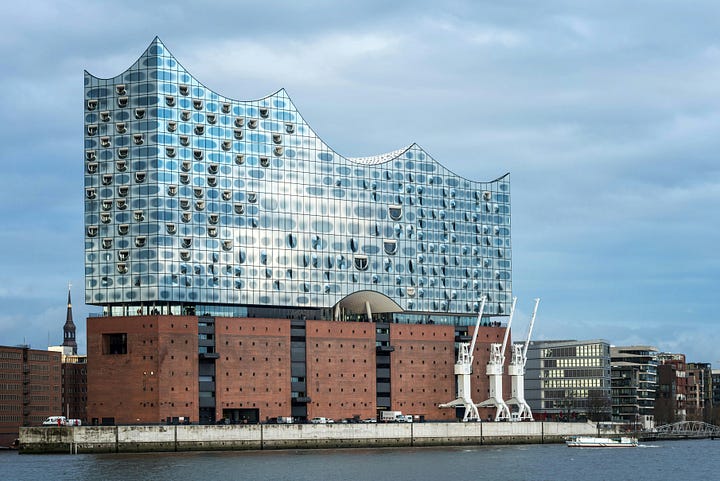Riding the Trick Escalator of Achievement
The Examined Run by ultramarathon runner Sabrina B. Little and how runners pursue achievement.
In 2017, while I was studying abroad in Germany, I visited a friend of mine in Hamburg. She had been an exchange student at my high school and we had stayed in touch a bit, so on one of my free weekends I took the train to her city. Hamburg is a beautiful place, especially Speicherstadt, an old warehouse district with massive red-brick buildings.
The other architectural marvel in Hamburg I clearly remember is the escalators in The Elbphilharmonie, which opened in January 2017—about six months before I visited. It is a 26-story building with concert halls, apartments, and a hotel. Seeing the building itself is impressive, so much so, in fact, that you can just go ride the escalator and get to one of the outer balconies overlooking the Norderelbe (Northern Elbe) river.


I’ve never really considered escalators impressive, nor do I really like them — I seriously always feel like I’m going to get injured on an escalator; don’t ask because I don’t why — but the escalators in the Elbphilharmonie were worth visiting. They are 80-meter arched escalators, so when you’re at the bottom of the escalator, you can’t see the end destination. It looks like you’ll be on the Elbphilharmonie escalator forever and ever until you die. The good folks at the Elbphilharmonie, though, have made the escalator ride a beautiful, almost heavenly, experience.
For someone who doesn’t like escalators, the prospect of what looked like an infinite escalator ride — in actuality, it’s about two-and-a-half minutes — frightened me a little. It also dredges up feelings of monotony. I remember thinking about what it would be like to be riding an escalator forever, getting higher and higher but ultimately never arriving at my destination.
It’d be like climbing a mountain to see the summit, except you never reach the summit and the forest is kind of ugly and boring so you can’t even enjoy nature. At that point, why bother?
Then, just a few weeks ago, I finished reading The Examined Run by philosopher and ultramarathoner Sabrina B. Little. The book discusses how virtue ethics and character development intersect with the sport of running. In the text, Little explores if running can make an individual a better person and if good people are better runners. I’ve never read a philosophy book before and I felt that Little’s writing was approachable and, as a runner, quite interesting.
Toward the end of the book, she discusses achievement and how runners, in particular, approach achievement. In the context of running—a sport where participants continually try to push their limits to get better—there really is no end point of achievement. Whereas you might receive 100% on a test in high school, there is no objective 100% in running. We constantly work to achieve more, push our limits, and perform better than we have before. It’s a continuous cycle that goes beyond sport and into other areas of life. You might get published in a free local newspaper, and then a newspaper with larger readership, but you’ll always be ogling the potential to write for The New York Times. And then after that? Probably a novel or some other kind of journalistic or writing achievement. The possibilities are endless.
And now, back to the escalator. Little writes, “Achievement is like a trick escalator that never arrives at its destination. It proceeds infinitely upward without relief.”
When I first read the sentence above I went “hmm” and then continued on. But I did come back to it because I then understood the truth of Little’s statement. In the world of running—and life—there is always something else to do, always a way to push yourself harder. Rarely is anything enough. Even my test example is not great because I remember myself in high school thinking it wasn’t enough to get 100% on a test; I needed to get extra credit or receive 100% on every test I took.
The reminder of achievement as a path with no destination is especially relevant this time of year as we all set New Year’s Resolutions (or goals or intentions, whatever you want to call them). Here, collectively, we think about the ways in which we can better ourselves. We mull over how we can improve our daily habits and how we can become better versions of ourselves. As a habitual planner, goal setter, and person who loves to be the best at things, I love thinking about this. I love to consider all the ways in which I can enrich and optimize myself. How can I be more productive? How can I be more creative? How can I improve my fitness? How can I make more money? How can I…?
I often feel that when I achieve something it doesn’t feel like a big deal. I graduated from college and it didn’t feel like a big deal. I didn’t even go to my own graduation ceremony. When I finished my Master’s, it was a bigger deal, but it didn’t feel like the end-all be-all of educational achievement. Something out there in the world would be much more impressive and I should do that… but once I find and do the impressive thing, it’s not impressive anymore. I’m just riding the escalator.
As I’ve reflected over the past month-and-a-half on my marathon completion, I’ve wondered what’s next. Do I do another marathon? Or do I switch gears and try to do something else really difficult? Part of this thought process predicates on the fact that while I do feel accomplished, I have a fading sense of the achievement. Okay, so I’ve run a marathon. Now what? Obviously, I know I did something hard and difficult and I feel proud of myself, but as I remove myself from the day itself I wonder if the sense of satisfaction I felt when I crossed the finish line will linger with me or if I will now need to fulfill that need for success with some other thing. Or another marathon, where I run faster and feel better and, and, and…
The key here, I think, is to understand that — perhaps — achievement isn’t the goal. Perhaps the process is the goal. Because the feeling of success and achievement is so fleeting, maybe we should do things for the joy and pleasure of doing them, to build our character, to open ourselves up to new experiences, and to try new things even if we initially suck at them. When we remove the desire for achievement, maybe that’s when we experience a true sense of accomplishment and purpose.
In the book, Little says, “It often seems like we talk about surpassing human limits without really caring about what a human is or about how to live a rich life and run beautiful races within the limitations we have.”
When I set my goals for 2025, I focused on joy and creativity. I thought about things I want to do and things I want to try, small and big. One of them is to do one push-up, unassisted. Another is to finish the second draft of the novel I’ve been working out. I also want to try to make pants.
I’d like to stop riding the escalator and pushing for perfection. I’d like to accept my limitations. I might make a really shitty pair of pants, but I tried, and honestly, just trying is part of the challenge.




"process is the goal." yes. keep goin' <3
Love this. And the community sounds like such a huge part of it! Having friends who also pursue improvement is such a massive boon for me; no matter what hobby or activity I'm doing. I'm glad you have good friends to push one another and encourage each other.